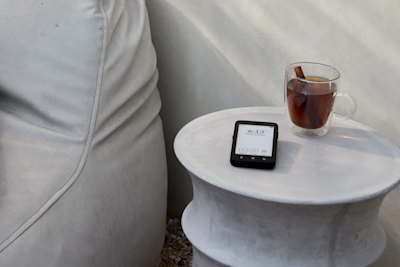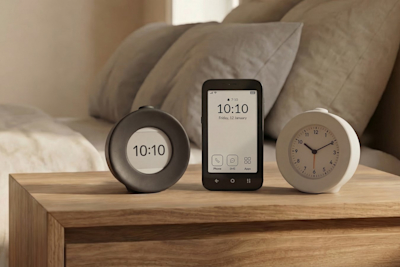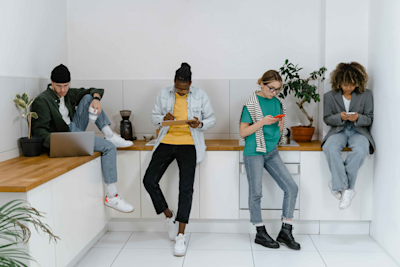
Reasons to Stop Using Your Smartphone as an Alarm Clock
Waking Up to a Healthier Routine
In today's digital, always-connected world, your smartphone is most likely the last thing you interact with at night and the first thing you reach for in the morning. However, what if we told you that your handy pocket companion, serving dutifully as your alarm clock, could be the silent saboteur of your good night's sleep?
At Mudita, we’re passionate about all things connected to health and wellness, and that includes healthy sleep hygiene. That’s why we’re always promoting ways to boost your well-being.
We’ve already covered the topic of how digital devices affect our sleep patterns, however, using your smartphone as an alarm clock is itself an issue, which many people just ignore for the sake of convenience.
Alarmingly, your go-to gadget may be stealing more than just your time; it might be robbing you of your well-being too. In this article, we’ll aim to shed light on the dark side of using smartphones as alarm clocks, unraveling the not-so-obvious impacts on your sleep and overall health.
So, if you've been wrestling with restless nights or yearning for more energized mornings, this might be the wake-up call you need.
Read on, and you may just decide to break up with your smartphone – at least in the bedroom.
1. Blinded by the (Blue) Light
Most of us don't think twice about that little pocket of information lighting up our bedside table. However, this seemingly innocent habit of relying on our smartphones as alarm clocks is more sinister than we think. Our smartphones emit a certain type of blue light which can disrupt the production of melatonin, a crucial hormone that regulates our sleep-wake cycle, or circadian rhythm. Lower melatonin levels can make falling asleep or staying asleep an uphill task. The 'quick peek' at your phone before bedtime might be costing you a good night's sleep. Ideally, avoid screens for about 90 min before bedtime to minimize blue light exposure and promote better sleep. However, if you have trouble staying off your phone for that long, try to stay off your phone 30 min before bed and leave it to charge in another room. [1][2][3]
2. Your Smartphone: An Unwelcome Bedtime Companion
Our smartphones have become an extension of ourselves, and as such, many of us leave them within arm's reach even while we sleep. This proximity can prove disruptive to your sleep. The temptation to check messages, emails, or social media during the night can interfere with your sleep pattern, fragmenting your rest. And it doesn't end there - unexpected notifications can jerk you awake, interrupting your peaceful slumber. Designating your bedroom as a smartphone-free zone could help reduce these sleep interruptions.
3. Battling the Clock: The Anxiety of Sleep
'Sleep anxiety' or 'orthosomnia' has become a modern-day sleeping disorder, and our smartphones are largely to blame. When you use your phone as an alarm clock, you may find yourself constantly checking the time and calculating how much sleep you'll get. This anxiety about sleep not only makes it harder to fall asleep but also diminishes the quality of your sleep. Choosing to use a traditional alarm clock can ease this anxiety and help you embrace a more restful night. If you use sleep tracking apps to monitor your slumber patterns, read our article on the subject for more insight how they can contribute to sleep anxiety. [4]
READ: Sleep tracking apps and their impact on sleep hygiene
4. The Chains of Digital Dependence
Reliance on smartphones as alarm clocks further deepens our attachment to technology. This over-dependence can feel like a shackle, restricting our freedom to disconnect. It's important for our mental and physical health to have some time away from our digital devices. That’s why, at Mudita, we’re fans of the digital detox. Intentionally unplugging, especially at the end of the day, allows our brains to pause, unwind and reset. Reserving the time before bed and the first few moments after waking up as technology-free moments could be used as mini digital detoxes, which can improve your overall well-being. [5][6]
5. A Mindful Morning: Start Your Day Right
Reaching for your smartphone as the first thing in the morning often leads us into the day in a reactive mode. Instead of taking a few moments to wake up mindfully, we get sucked into the whirlwind of emails, news, and social media updates. Choosing to ditch the smartphone alarm can help set a proactive tone for the day, giving you time to wake up fully and plan your day ahead.
Mudita Bell and Mudita Harmony were both created to be intentionally offline, with the aim of helping you to wake up rested and refreshed. This way, you can experience the benefits of a mini-digital detox throughout the night and into the morning.
Mudita Bell & Mudita Harmony
Final Thoughts
Quality sleep is a cornerstone of good health. If we're not sleeping well, it's crucial to take steps to improve our sleep hygiene. Swapping the smartphone alarm for a traditional alarm clock, like Mudita Bell or Mudita Harmony, might seem like a small change, but its impact on your sleep quality and overall health can be significant.
While the convenience of using a smartphone as an alarm clock can be appealing, the potential negative impacts on your sleep quality and overall health are not worth the risk.
Keeping the smartphone out of the bedroom can make your sleep space more conducive to restful, restorative sleep.
By incorporating these changes into your routine, you can sleep better, wake up more refreshed, and lead a healthier, happier life. Sleep well, live well.
Mudita Harmony
If you’d like to read more about topics connected to the subject of better sleep, please take a look at our Sleep Better page for more information and helpful resources.
Read also:
Join the conversation
Our forum is a great place to share ideas and discuss topics connected to wellness and well-being.
Related stories

Why Kompakt is a Different Kind of Upgrade for the New Year
A different kind of upgrade for the new year. Discover how Mudita Kompakt, a minimalist phone, helps reduce digital overload & restore focus, balance & clarity.

Reclaiming the Year Ahead, One Intentional Choice at a Time
Reclaim your year through small, intentional choices. Learn how digital decluttering and mindful technology can restore focus, calm, and clarity.

Are Smartphones Breaking Social Norms?
Smartphones are reshaping social norms, disrupting etiquette and face-to-face connection. Learn how mindful tech use can restore balance.
If you'd like to receive the best stories from our blog, keep up to date with our progress and get notified about our product releases and special discounts.